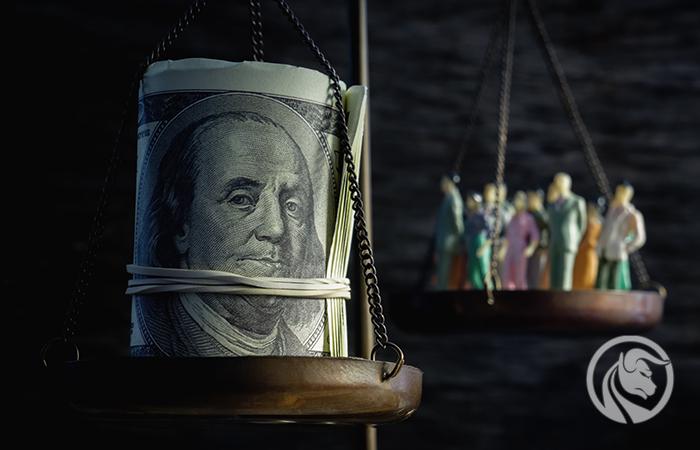US debt drama. Is investor fear justified?
It has long been believed in the financial world that the United States will always be able to pay off its government debts. This confidence in US financial strength is not surprising as it has the power to print the main reserve currency. This advantage attracts many willing investors to lend money to the United States, ensuring that they always have enough money to pay off their debts.
CHECK: US DEBT CLOCK [LIVE]
Is investor fear justified?
However, now Washington is showing everyone again that the default of the world's leading superpower is quite possible. Moreover, not only theoretically, but quite practically due to the stubbornness of politicians. The United States faces the recurring problem of exceeding the limit of debt it can have. Currently, the public debt is 31,4 trillion dollars, which is 117% of the country's GDP. Similar situations have happened before, as in 2011 and 2013.
The US Congress should raise this ceiling or refuse it, provoking the Treasury Department into default and payments. Treasury Secretary Janet Yellen warned that her department's ability to delay insolvency with available money could end on the first day of summer. That's why today Joe Biden arranged a meeting with Congress about raising the US national debt. Talks between President Biden and congressional leaders on the US debt ceiling are scheduled for 15 p.m.
Since last year's midterm elections, the Republican-controlled House of Representatives has been trying to force concessions from President Biden, arguing that America's creditworthiness is at stake. However, everyone is convinced that the negotiators will find a way out of the impasse they have entered.
The essence of US sovereign debt default is that unless the government debt ceiling is raised, the state will be unable to pay its external and internal creditors. These, in turn, will lose the ability to pay each other, which will automatically lead to a general and complete collapse. The fear of investors and the desire to protect their money is understandable.
How will a default affect the markets?
During the last major dispute between Republicans and Democrats over the government debt ceiling ten years ago, Fed analysts created a computer model of a default that would last a month. The model showed a 30% collapse in the stock market value and a 10% weakening of the dollar.
Raising the public debt ceiling is not the end of the problems
However, it should be emphasized that while the probability of US default is higher than usual, the actual probability remains very low. As history has shown, the issue of the national debt tends to unfold as a drawn-out drama with Democrats and Republicans engaged in negotiations just before the US treasury runs out of cash. It is therefore expected that an agreement will be reached by the end of May.
While some analysts suggest that this timing may be different, the prevailing belief is that even if the debt drama extends beyond its due date, it will only last for a short time. Ultimately, this will lead to an increase in the public debt ceiling. Therefore, one way or another, whether shortly before or shortly after June 1, the debt ceiling is expected to be raised by $1,5 trillion.
This marks the beginning of an interesting phase. Once the government approves raising the debt ceiling, Federal Reserve will start supplying the US budget with liquidity. It should be noted, however, that the entire $1,5 trillion will not be donated directly. Instead, the US Treasury Department will issue bonds to secure most of the required liquidity. As a consequence, financial markets will experience a decrease in overall liquidity. As a result, challenges may occur with a delay of around 1-2 months, potentially leading to a market decline in June or July due to liquidity constraints.
These challenges will compound existing bank problems, recession risks and real estate struggles. The real estate sector in particular was hit hard by high lending rates, which resulted in a significant decline in residential and commercial transactions, almost to the point of stagnation. These additional difficulties will add even more strain to an already tense economic situation. Overall, one thing is certain, volatility in the financial markets will increase dramatically in the coming weeks and we need to be ready for that.






















![Forex Club – Tax 9 – Settle tax on a foreign broker [Download the Application] Forex Club - Tax 9](https://forexclub.pl/wp-content/uploads/2024/02/Forex-Club-Podatek-9-184x120.jpg?v=1709046278)
![Trading View platform – solutions tailored to the needs of traders [Review] trading view review](https://forexclub.pl/wp-content/uploads/2024/03/trading-view-recenzja-184x120.jpg?v=1709558918)
![How to connect your FP Markets account to the Trading View platform [Guide] fp markets trading view](https://forexclub.pl/wp-content/uploads/2024/02/fp-markets-trading-view-184x120.jpg?v=1708677291)
![CRB index – one of the popular commodity market benchmarks [Guide] crb index](https://forexclub.pl/wp-content/uploads/2024/05/indeks-crb-184x120.jpg?v=1715055656)
![How to invest in ChatGPT and AI? Stocks and ETFs [Guide] how to invest in chatgpt and artificial intelligence](https://forexclub.pl/wp-content/uploads/2023/02/jak-inwestowac-w-chatgpt-i-sztuczna-inteligencje-184x120.jpg?v=1676364263)






![Izabela Górecka – “Success on the market depends not only on knowledge, but also on emotional stability” [Interview] Izabela Górecka - interview](https://forexclub.pl/wp-content/uploads/2024/04/Izabela-Gorecka-wywiad-184x120.jpg?v=1713870578)
![WeWork – the anatomy of the collapse of a company valued at $47 billion [WeWork, part II] wework bankruptcy story](https://forexclub.pl/wp-content/uploads/2024/04/wework-bankructwo-historia-184x120.jpg?v=1711729561)
![Adam Neumann – the man who screwed up Softbank [WeWork, part AND] adam neumann wework](https://forexclub.pl/wp-content/uploads/2024/04/adam-neumann-wework-184x120.jpg?v=1711728724)

![The most common mistakes of a beginner trader - Mr Yogi [VIDEO] Scalping - The most common mistakes of a beginner trader - VIDEO](https://forexclub.pl/wp-content/uploads/2024/03/Scalping-Najczestsze-bledy-poczatkujacego-tradera-VIDEO-184x120.jpg?v=1711601376)
![Learning patience: No position is also a position - Mr Yogi [VIDEO] Scalping - Learning patience - No position is also a position - VIDEO](https://forexclub.pl/wp-content/uploads/2024/03/Scalping-Nauka-cierpliwosci-Brak-pozycji-to-tez-pozycja-VIDEO-184x120.jpg?v=1710999249)
![When to exit a position and how to minimize losses - Mr Yogi [VIDEO] Scalping - When to exit a position and how to minimize losses - VIDEO](https://forexclub.pl/wp-content/uploads/2024/03/Scalping-Kiedy-wyjsc-z-pozycji-i-jak-minimalizowac-straty-VIDEO-184x120.jpg?v=1710336731)


















